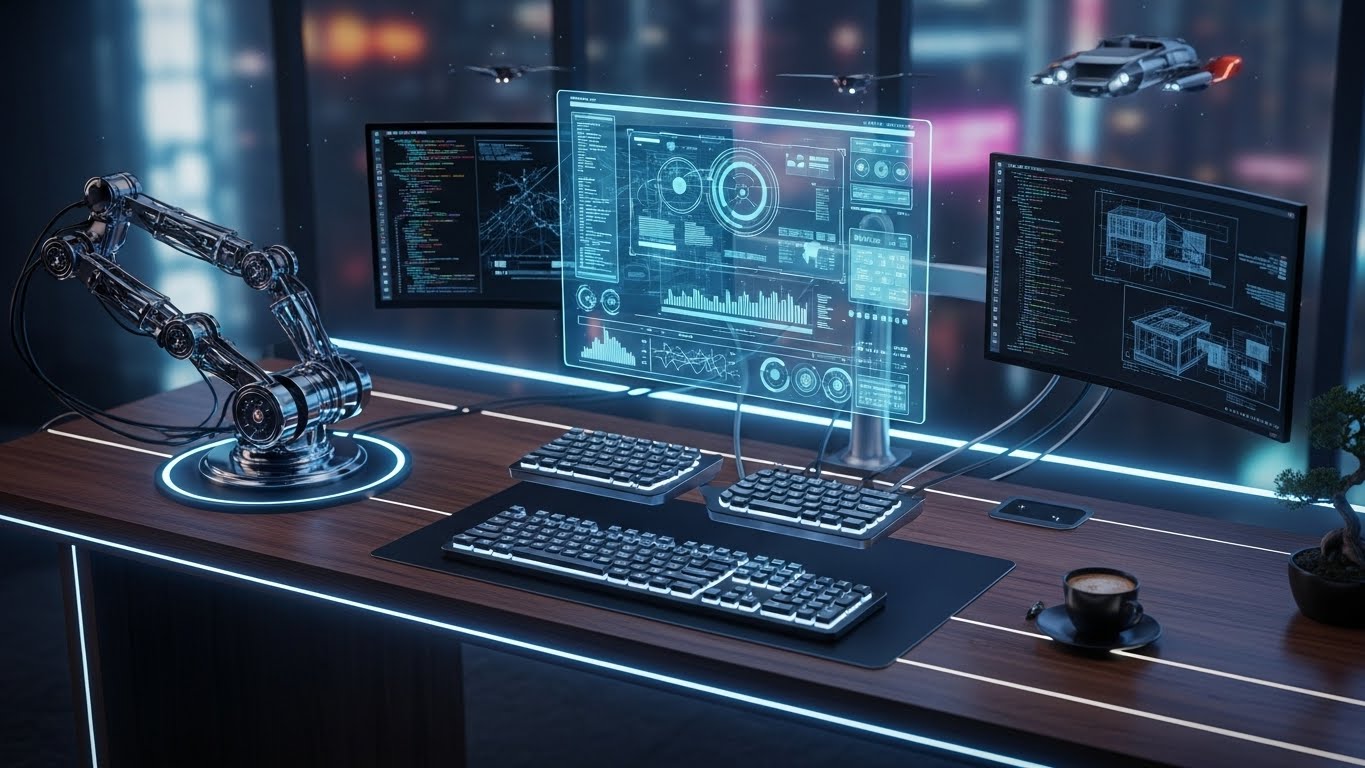Technology is no longer just a tool we use—it’s an integral part of our everyday lives. From the devices we carry in our pockets to the networks that connect us globally, technology is shaping the way we live, work, and interact. But as quickly as we’ve come to depend on it, technology is evolving at an even faster pace. In this blog post, we’ll explore some of the most exciting technological advancements and how they’re changing our world.
The Rise of Artificial Intelligence and Machine Learning
Artificial Intelligence (AI) and Machine Learning (ML) are among the most significant technological innovations in recent years. AI has moved beyond simple automation to create systems that can learn, adapt, and make decisions based on data. This has a wide range of applications, from self-driving cars and personal assistants like Siri to healthcare and financial services.
Machine Learning, a subset of AI, allows systems to improve their performance without explicit programming by recognizing patterns and making predictions. From recommendation engines on Netflix to fraud detection systems in banks, ML is being used to enhance efficiency and accuracy in countless industries. As AI continues to evolve, its potential to revolutionize sectors like healthcare, education, and manufacturing becomes even more evident.
5G Technology: The Next Generation of Connectivity
One of the most anticipated tech developments is the rollout of 5G technology. While 4G revolutionized how we access the internet on our smartphones, 5G promises to take connectivity to the next level. With faster speeds, lower latency, and the ability to connect a vast number of devices simultaneously, 5G will enable innovations we can only begin to imagine.
For example, 5G will make smart cities more feasible, allowing for real-time data transfer that can optimize traffic flow, manage energy consumption, and enhance public safety. Additionally, industries like augmented reality (AR) and virtual reality (VR) will be able to offer more immersive experiences, as 5G can provide the bandwidth needed for high-quality, lag-free interactions. As 5G networks expand, they’ll serve as the backbone for a more connected and efficient world.
Quantum Computing: A Leap into the Future of Processing Power
Quantum computing is one of the most fascinating and complex fields in technology today. Unlike classical computers that process information in binary (0s and 1s), quantum computers use qubits, which can exist in multiple states at once. This allows quantum computers to solve certain types of problems much faster than traditional machines, making them ideal for complex calculations in fields like cryptography, materials science, and medicine.
While quantum computing is still in its infancy, progress is being made at a rapid pace. Once fully realized, quantum computers could revolutionize industries by providing unprecedented computational power. For example, they could help develop new drugs by simulating molecular structures more efficiently or optimize logistics and supply chains in ways never thought possible. However, there are still technical hurdles to overcome before quantum computing becomes mainstream.
The Internet of Things (IoT): Connecting the World Around Us
The Internet of Things (IoT) refers to the growing network of physical devices connected to the internet, allowing them to collect and exchange data. From smart thermostats and refrigerators to wearable fitness trackers and connected cars, IoT devices are becoming increasingly common in households and businesses.
IoT is transforming industries such as healthcare, agriculture, and manufacturing by providing real-time data that can be analyzed to improve efficiency, reduce costs, and enhance customer experiences. For example, smart sensors in agricultural equipment can monitor soil moisture levels and optimize irrigation, while wearable health devices can track vital signs and alert doctors to potential health risks.
The continued expansion of IoT will lead to smarter homes, more efficient workplaces, and improved quality of life, as connected devices become more integrated into our daily routines.
Blockchain: Redefining Security and Trust
Blockchain technology, most famously known for supporting cryptocurrencies like Bitcoin, is emerging as a powerful tool for securing and verifying transactions across a wide range of industries. At its core, blockchain is a decentralized, distributed ledger that records transactions in a secure, transparent, and immutable way.
Beyond cryptocurrencies, blockchain has the potential to transform fields such as supply chain management, voting systems, and digital identity verification. In supply chains, for example, blockchain can provide end-to-end transparency, ensuring that products are sourced ethically and delivered on time. In healthcare, it could be used to securely store patient records, ensuring privacy while allowing for easier access by authorized professionals.
The promise of blockchain lies in its ability to create trust without intermediaries. As industries begin to adopt this technology, we could see a shift toward more secure and transparent business practices.
Robotics and Automation: Redefining Work and Industry
Robotics and automation are rapidly changing the landscape of manufacturing, logistics, healthcare, and many other industries. Automation technologies, such as AI-powered robots and drones, are taking over repetitive, dangerous, and labor-intensive tasks, allowing human workers to focus on more creative and strategic roles.
In manufacturing, robots can assemble products with incredible precision, reducing errors and increasing efficiency. In healthcare, robotic surgery and assistive devices are improving patient outcomes and making procedures less invasive. Autonomous vehicles are also beginning to change the way goods are transported, with self-driving trucks potentially reducing the need for human drivers.
While automation brings undeniable benefits in terms of efficiency and safety, it also raises questions about the future of work. As machines take over certain tasks, there will be a growing need for workers to acquire new skills and adapt to a changing job market.
The Ethical Implications of Technological Advancements
As technology continues to advance at an unprecedented rate, it raises important ethical questions. For instance, AI and automation could lead to job displacement, and quantum computing may pose security risks if not properly managed. Additionally, with the increasing reliance on data and personal information, privacy concerns are more pressing than ever.
It’s essential that as we embrace these innovations, we also consider their impact on society and ensure that they are developed and deployed in ways that benefit all. Policymakers, industry leaders, and technologists must work together to establish guidelines and regulations that ensure technological advancements are used responsibly.
Conclusion: Embracing a Future Shaped by Technology
The world of technology is evolving at a rapid pace, and the innovations we’re seeing today are only the beginning. From AI and 5G to quantum computing and blockchain, these advancements are reshaping industries, creating new opportunities, and challenging us to think about the future in new ways.
As we continue to embrace and integrate these technologies into our daily lives, it’s important to remain mindful of their ethical, social, and economic implications. The future of tech holds immense promise, and it will be exciting to see how these innovations continue to shape our world in the years to come.



